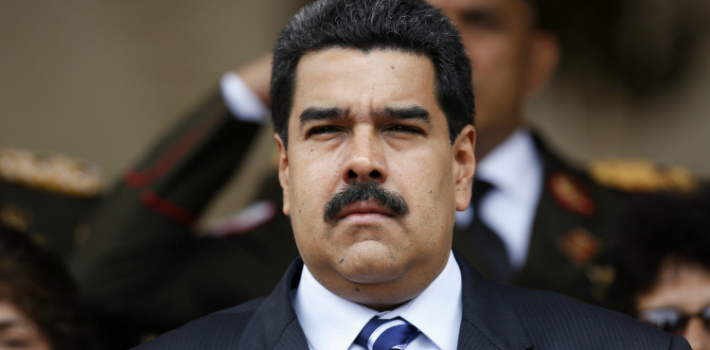
EspañolVenezuelans rushed to social media to complain that Movilnet, the nationalized mobile telephone company, sent them fear-mongering, pro-Chavista text messages warning them not to vote for the opposition in the upcoming legislative election, which will be held on December 6.
The message stated that if the “right-wing” wins the legislative election, users’ jobs would be at risk. While some messages were anonymous, others were signed by late president Hugo Chávez.
Aquí les dejo como los delincuentes del gobierno, utilizan Movilnet para difundir estos mensajes de intimidación pic.twitter.com/m2nrca3Lhw
— EF (@SoloMaracuchos) December 1, 2015
“Here’s how the government’s criminals use Movilnet to spread their messages of intimidation.”
Five days prior to the election, the ruling United Socialist Party of Venezuela has intensified its campaign with threats, blackmail, and manipulative tactics in order to sway the vote its way.
On November 25, National Assembly Speaker Diosdado Cabello threatened the opposition in his weekly TV show: “you don’t even know what to expect on December 6 … because we are brutes,” he said.
A week before, Venezuelan President Nicolás Maduro said that he and the army are “militarily ready” to take to the streets in case of a defeat.
On October 23, he warned that “chaos” would ensue if the Chavistas came in second place, and called on his followers to “defend the revolution [on election day], no matter what happens.”
These are just some of the warnings which the Venezuelan president has uttered after personally taking charge of the campaign. He has constantly used Chávez’s image to gain voters’ sympathy.
Venezuelan election laws forbid any calls to war, discrimination, intolerance, or legal disobedience. But the Chavista-controlled National Electoral Council (CNE) has remained silent, refusing to apply penalties on those promoting fear-mongering tactics.
Currently in Venezuela, the ruling party’s candidates appear not to be taking part in the race. Even after Chávez’s death, his face still appears on billboards and on TV, while his voice is constantly heard on radio ads.
The Government Openly Ignores the Law
The law also forbids the use of public funds to run a campaign. However, Speaker Cabello, who is also running for a seat in Congress, delivered 200 new taxi cabs in his home state of Monagas.
Cabello said that he was representing President Maduro, and that the vehicles formed a part of the Transportation Mission welfare program. Furthermore, he told the new cars’ recipients: “If you want to thank someone for this, thank the revolution, Chávez, and Maduro.”
On that same day, the Education Ministry handed over 5,880 computer tablets to university students in the state of Portuguesa. Wilmar Castro Soteldo, a Chavista candidate who governs the state, officiated the ceremony.
The PSUV’s tactic has been to increase welfare handouts in the states under its rule. “Wherever the Bolivarian government has worked, Chávez’s candidates will be there, because we are part of a revolution,” Cabello admitted during an official event.
Venezuelan-based human-rights NGO Provea criticized Cabello’s statements and said that he should be prosecuted, since by using public funds during the campaign, he has violated the Anti-Corruption Act, the Election Process Act, and the Constitution.
[adrotate group=”8″]
Political analyst Jorge Tricás told the PanAm Post that none of the government’s actions will impact the voters’ decision. “By using psychological terror in its campaign,” he said, “the government has revealed the regime’s totalitarian nature.”
He adds that Maduro’s administration aims to attack civil liberties by creating a climate of illegality and widespread suspicion.
If Cabello or any other government spokesman emits electoral propaganda that discourages exercising the right to vote, they would violate article 75 of the Election Process Act.
Tricás says that Chavista ideology is failing to address Venezuela’s current “micro and macroeconomic problems.” These are reflected in shortages of basic goods, high inflation, and low wages.
“The use and abuse of government resources won’t have an impact on citizens’ decisions. The people’s desire for change is irreversible,” he adds. He also anticipates that, if the government ignores the election’s results, it will reveal to the world “that this is a totalitarian dictatorship, because Maduro won’t be accepting the majority’s decision.”
Opposition Denounces State Intimidation
The opposition Democratic Unity Roundtable (MUD) reported to the CNE that government-owned media was refusing to run their political ads. This would constitute yet another violation of electoral law.
“Someone from the government made a phone call to a state-owned television channel. After that, our ad wasn’t run on that day,” MUD General Secretary Jesús Torrealba said.
He claimed that the Venezuelan government was controlling the media with its “coercive, fear-mongering, terrorist tactics.”
The government has also engineered a strategy to confuse voters, using names for its allied parties that are strikingly similar to that of the MUD.
The opposition’s candidates appear on the “Unidad” list, which will appear on the ballot next to an pro-government party called “Min-Unidad,” which uses the same colors as the opposition party.
 Versión Español
Versión Español












